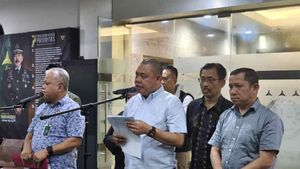JAKARTA - The draft general policy for the 2020 Temporary Budget Priority Ceiling (KUA-PPAS) has been discussed at each Commission in the DPRD together with the DKI Provincial Government.
After being discussed, it turned out that the proposed DKI budgeting had jumped to Rp97 trillion. In fact, previously the DKI Provincial Government submitted a budget ceiling in the KUA-PPAS of IDR 89.44 trillion as of 23 October. This nominal value is an efficiency of the initial budget proposal of IDR 95 trillion.
Regional Secretary of DKI Jakarta Saefullah considers this additional budget to be a natural thing. He does not want to think that the joint budget analysis of the five Commissions in the DPRD has not been effective.
"I think it's the dynamics of the discussion, it's normal. Fluctuations, priorities are not priorities, that's normal," said Saefullah at the DPRD Building, Jalan Kebon Sirih, Central Jakarta, Thursday, November 21.
The problem is, based on the calculation of the financial revenue plan in 2020, the DKI Provincial Government will only receive an income of IDR 87 trillion. That means, there is a budget submission deficit of IDR 10 trillion.
Based on data received from the DKI Regional Planning and Development Agency (Bappeda), there are a number of budget items that have swelled.
The swelling is in the budget to subsidize the premium of 5.1 million people who receive premium assistance (PBI) for the Social Security Administering Body (BPJS) for Health.

The proposed initial budget is IDR 1.4 trillion for the subsidy. However, the DKI Provincial Government then proposed an additional budget of IDR 1.16 trillion and the total was IDR 2.5 trillion due to the increase in national BPJS Health contributions starting in 2020.
Then, another budget swelling is the salary for other individual service providers (PJLP) within the DKI Provincial Government following the increase in provincial drinking wages (UMP). In total, there was an increase in PJLP salaries of IDR 451 billion.
Not only that, there is also an increase in BPJS Health contributions for civil servants (PNS) which the DKI Provincial Government has to pay for Rp 275.99 billion.
For this deficit budget adjustment, Saefullah said that the DKI Provincial Government and the DPRD must reduce a number of budget items that will be discussed in the Budget Board (Banggar) meeting before ratifying the draft APBD.
"The way to reduce it is discussed at the Budget Agency. How to reduce the Rp10 trillion, which should be removed, which ones are reduced, which are national priorities, which are regional priorities, and which are mandatory programs," explained Saefullah.
This deficit problem was only discovered before the deadline for APBD approval on November 30. This deadline is determined by the regulations of the Ministry of Home Affairs. This means that DKI only has 9 days to pursue budget sweeping in Banggar, ratifying the draft APBD (RAPBD), reworking the RAPBD until the stipulation of the 2020 DKI APBD.

Separately, Deputy Chairman of the DKI DPRD, Muhammad Taufik, is not sure that his party will be able to pursue the budget discussion to the final in this thin period of time. He said that the DPRD needs time to make reductions in programs that are not considered a priority.
Therefore, the DPRD wrote to the Ministry of Home Affairs asking for an extension of about half a month. Because, according to him, the Ministry of Home Affairs will only evaluate it on December 15.
"We've asked for time, the Ministry of Home Affairs has at least December 15 to evaluate all of Indonesia. So we need time. Last year we (discussed the budget) also until December," said Taufik.
The English, Chinese, Japanese, Arabic, and French versions are automatically generated by the AI. So there may still be inaccuracies in translating, please always see Indonesian as our main language. (system supported by DigitalSiber.id)










